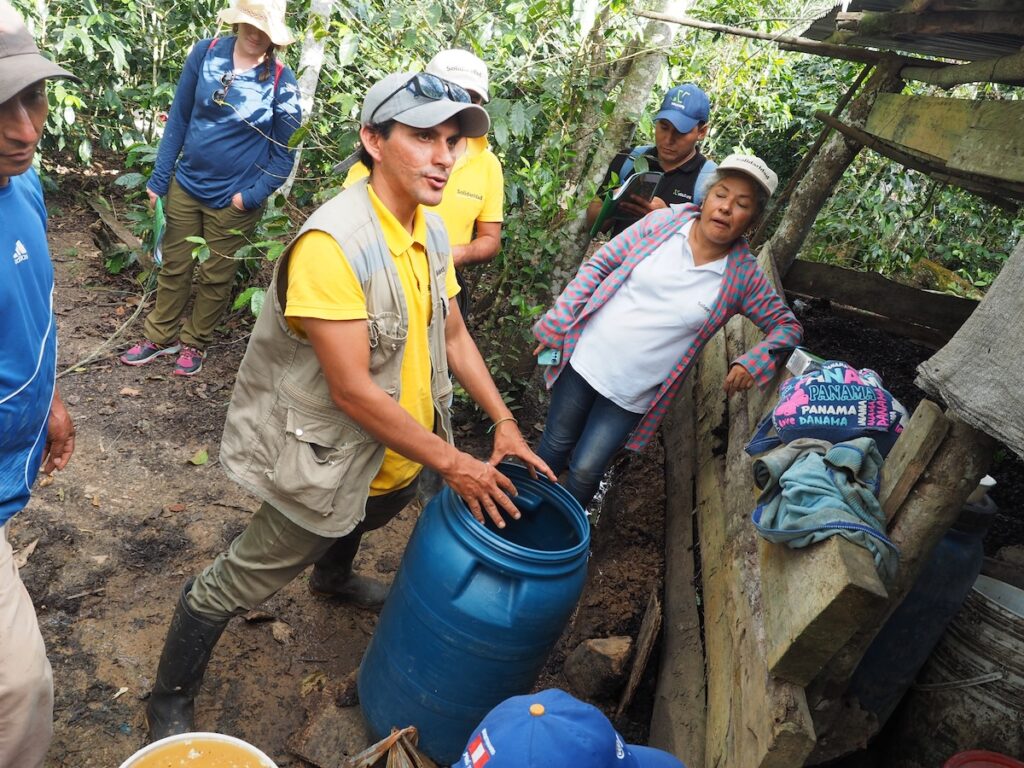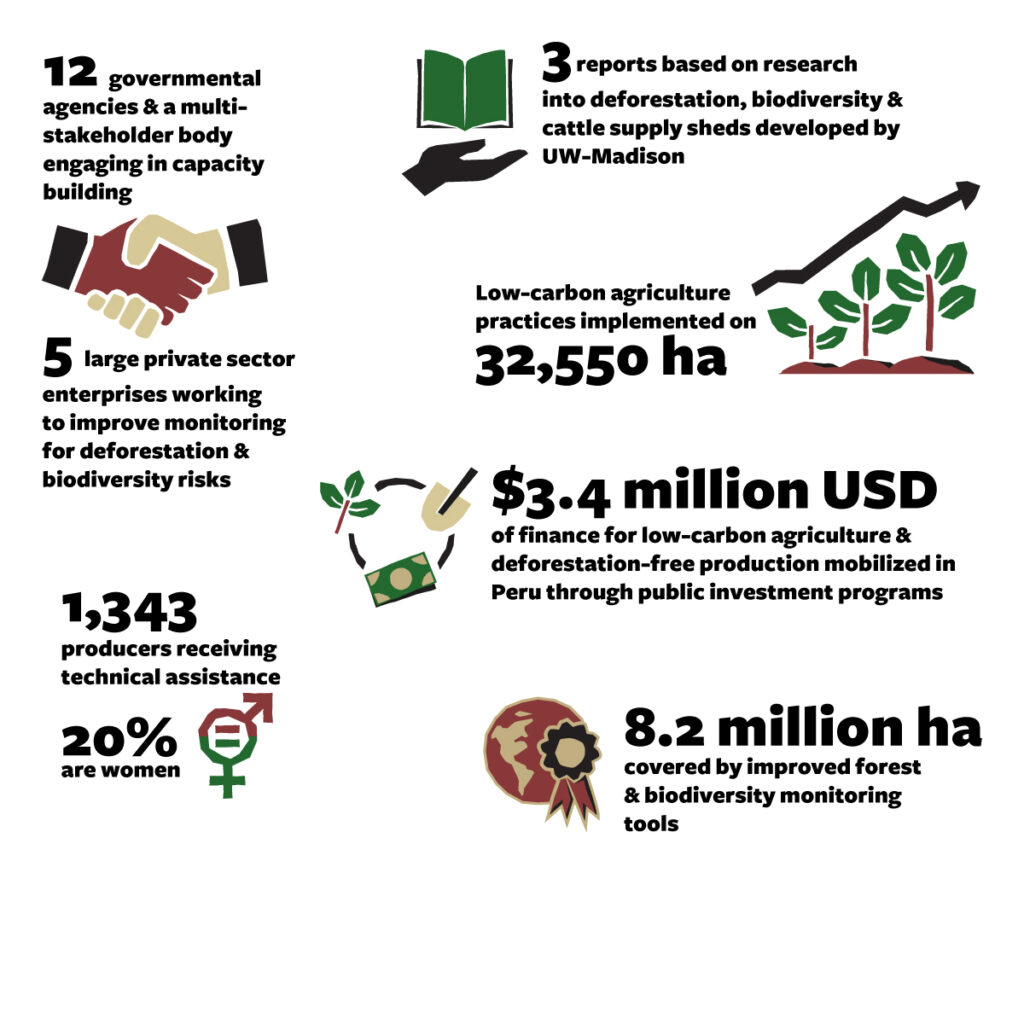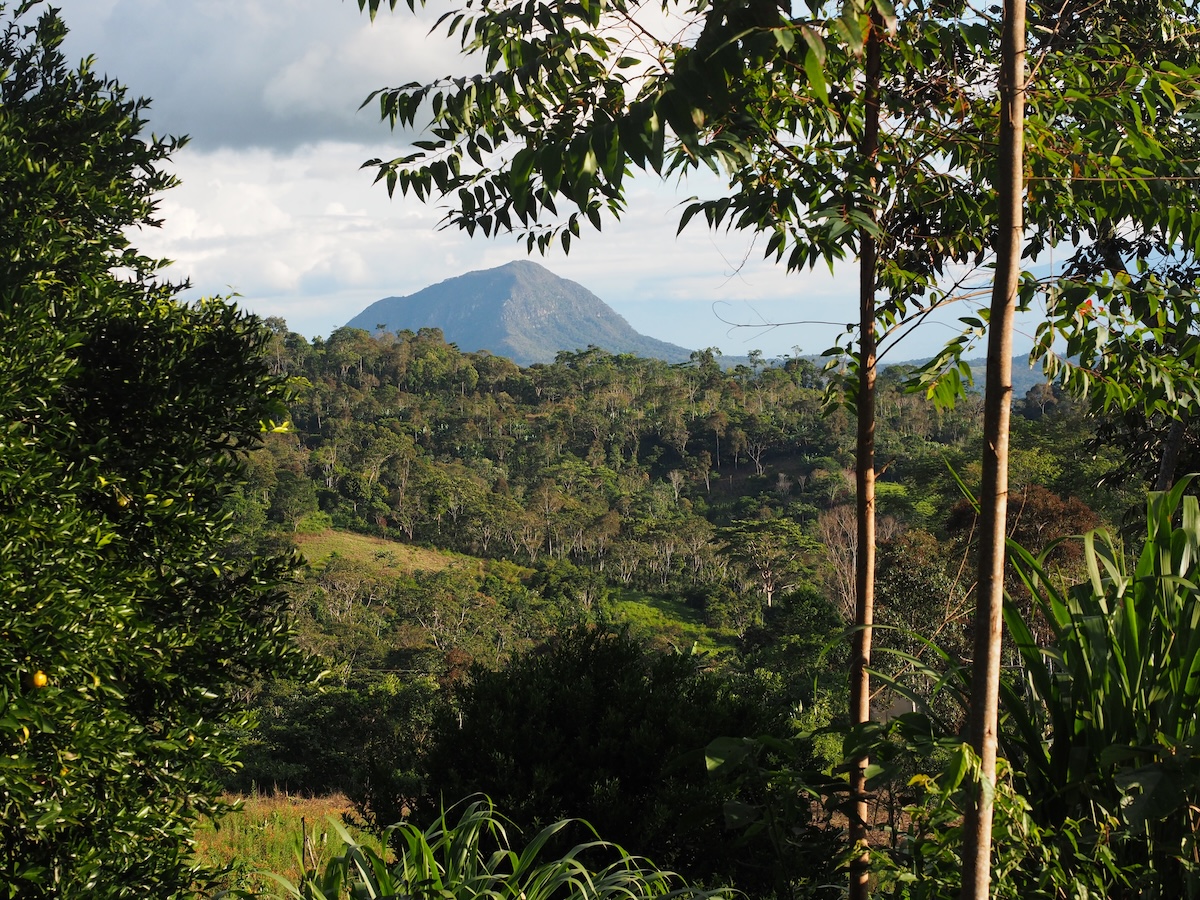Down a winding road outside Moyobamba, Peru, the coffee plot of Diomedes Santos Huamán is perched on a steep hillside. Farmers and visitors gather around as Diomedes and a trainer from Solidaridad stir up a concoction to be spread on coffee plants across the parcel. The mixture of fresh manure, leaves and microorganisms is an effective natural fertilizer that utilizes waste water from the coffee washing process and costs a lot less than chemical fertilizers.

During the tour, participants observed different approaches to composting and coffee farming that can help farmers improve their productivity and lessen pressure on local forests. Practices like these are part of the suite of low-carbon agriculture practices being implemented across the Amazon region as part of Amazonia Connect, a five-year program to scale up low-emission commodity production to improve biodiversity conservation. The program works in coffee, livestock and palm oil supply chains in Peru, Brazil and Colombia.
Amazonia Connect – a partnership between USAID, Solidaridad, Earth Innovation Institute, the National Wildlife Federation and University of Wisconsin-Madison – recently concluded its first year of implementation. Teams set baselines and deepened relationships with producers, regional and local governments, private sector partners and other stakeholders. Important progress included:
- 1,343 producers received technical assistance (20% women)
- Low-carbon agriculture practices implemented on 32,550 ha
- Improved forest and biodiversity monitoring tools covering an area of 8.2 million ha
- 5 private sector enterprises engaged to improve monitoring for deforestation and biodiversity risks (2 in Colombia, 2 in Brazil, 1 in Peru)
- 12 governmental agencies & 1 multi-stakeholder body engaged in capacity building to implement local and regional strategies that support sustainable livelihoods and low-emission rural development.
- $3.4 million USD of finance for low-carbon agriculture and deforestation-free production mobilized in Peru through public investment programs
- 3 reports based on research into deforestation, biodiversity & cattle supply sheds developed

Implementing low-carbon practices in livestock value chains in Brazil
In Brazil, Amazonia Connect works with small & medium-sized cattle ranchers to implement low-carbon agricultural practices (LCA) and produce more in a smaller area and with a lower impact on the land. In the first year, we worked with over 700 cattle producers to implement these practices on a total of nearly 24,000 hectares. Further up the supply chain, Amazonia Connect improved and integrated additional datasets into Visipec, a supply chain monitoring and traceability tool, and began supporting companies to comply with zero-deforestation agreements when sourcing beef.
Amazonia Connect partners also worked with regional and local governments in Mato Grosso and Pará to build their capacity for entering carbon markets, and analyzed the possibility of developing incentive programmes for farmers adopting LCA practices. Reducing deforestation and building sustainable value chains will require the support of financial institutions and investor groups. Amazonia Connect worked to educate these groups on the importance of reducing cattle-driven deforestation and investing in monitored supply chains.
Understanding coffee and dairy value chains in Colombia
In Colombia, the team conducted assessments with dairy and coffee producers to understand their perspectives and priorities. They also worked with Nestle to support dairy farmers in their supply chain as they implemented LCA practices to achieve a regenerative agriculture certification, which can lead to higher incomes.
Similar to Brazil, monitoring and traceability tools are indispensable to understanding the socio-environmental risks in livestock value chains. Amazonia Connect partners integrated datasets covering biodiversity, deforestation and supply chain infrastructure into Visiprast, a supply chain monitoring and traceability tool. A number of companies in the region are engaged with Amazonia Connect to begin using the tool.
Building inclusive palm and coffee sectors in Peru
Palm oil and coffee value chains are the focus of work in Peru. In the palm sector, the team signed cooperation agreements with three oil palm mills and conducted trainings on LCA and sustainable palm oil production. Over 269 palm producers were trained (32% women) with low-carbon practices implemented on 1,565 ha. Training on inclusive technical assistance helped prepare field staff to ensure that lessons are accessible to all in the communities where the teams work. In palm oil, in particular, a gender and social inclusion assessment will inform our practices going forward. Teams also worked to adapt the Visiprast monitoring and traceability tool to the specific needs of the palm sector.
In coffee, the team laid the groundwork to expand payments for ecosystem services to coffee farmers in San Martín via the ACORN Platform, an initiative that incentivizes agroforestry practices that sequester carbon. Amazonia Connect also worked with regional governments in San Martín and Ucyali to mobilize US $3.4 million to scale up LCA and deforestation-free production through public investment programs. On-farm monitoring will be critical to these efforts, and a monitoring methodology for primary and secondary forests on coffee farms was validated in Peru to support companies as they integrate tools into their practices (see the report in Spanish).
Focusing on connection across the Amazon Basin
The overall goal of Amazonia Connect is to create scalable solutions that can reduce commodity-driven deforestation and habitat loss, support resilient livelihoods, and contribute to global efforts to avoid the worst effects of climate change. Partners work across public and private sectors to find linkages that lead to systemic changes across the region.
Amazonia Connect works across four thematic areas, including:
- Promotion of low-carbon production practices – Low-carbon agriculture reorients farming systems to ensure farm viability and conservation. Adoption of these practices is critical for reducing pressure on sensitive ecosystems and carbon emissions.
- Engagement with market actors – Due diligence and legislation on deforestation are pushing the private sector to better understand risks in their supply chains. Amazonia Connect engages private sector partners to adopt monitoring tools to ensure compliance with zero-deforestation agreements.
- Expansion of finance for sustainable production – Lack of access to financing often hinders the adoption of better practices, which can result in further encroachment on sensitive areas. Finance for improvements and incentives for ecosystem services can increase adoption of low-carbon practices.
- Application of research and learning – Policy briefs, scientific papers and other products improve the understanding of supply chains. They also inform how jurisdictional approaches, traceability and low-carbon practices can support deforestation-free production and biodiversity conservation.

